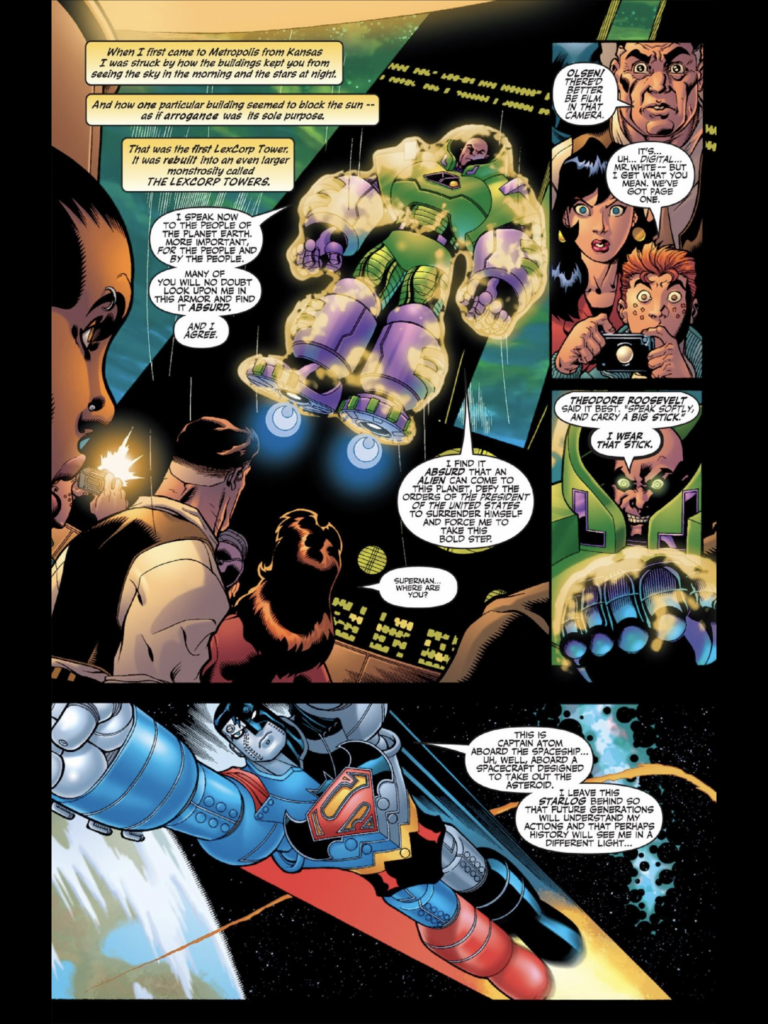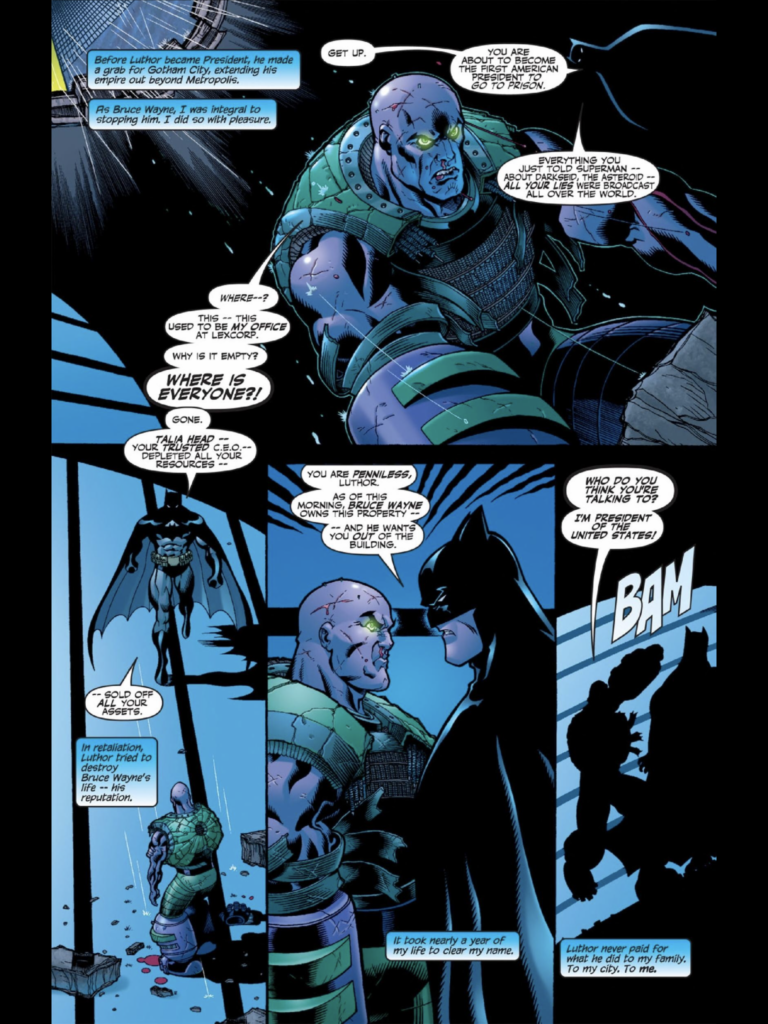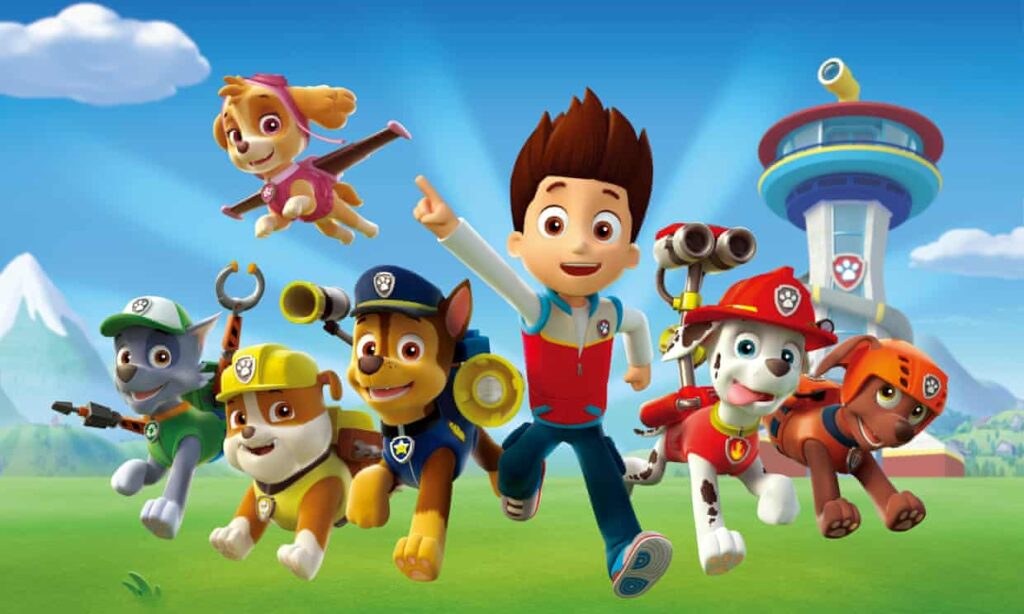YouTube Version | Podcast Version | Get this in your Inbox
- Hydra

In the film Captain America: The Winter Soldier, it’s revealed that S.H.I.E.L.D, the government organization Captain America and the Avengers have been working for, has long since been infiltrated and taken over from within by the Nazi splinter group Hydra. After battling these compromised government agents for most of the film, our hero discovers that Hydra has taken control of three enormous Helicarriers linked to spy satellites with the goal of ‘stopping threats before they start’.
And so Captain America picks up a protest sign and peacefully marches as the Helicarriers take off.
I’m just kidding, he actively sabotages them, destroying millions of dollars in government property. But it’s fine because his ally, the Black Widow, appears before a Senate subcommittee and explains everything, and everyone in the Senate and the public accept that destroying the Helicarriers was the right course of action, the end.
Meanwhile, in the real world, police departments all over the country have been infiltrated by White Supremacists as reported by PBS Newshour. This has been known for years, and very little has been done about it, which is why in recent protests, we’ve seen them routinely take the side of white nationalist vigilantes. That’s why when white supremacists marched on state capitals demanding their right to be infected by a plague, the police gave them free rein. And when the police murder black people, prosecutors let them off the hook because they need to work closely with the police to do their job. The Internal Affairs people who are supposed to police the police (and are ironically hated for that role) are in fact police themselves beholden to the same police authorities. Anyway, if you actually try to file a complaint you’re liable to followed and harassed.
And so the people peacefully protest. And so these protesters are tear gassed, shot at with disabling rubber bullets, assaulted, and pepper sprayed indiscriminently. Over and over again we see evidence of peaceful protesters being attacked by police unprovoked, police brutalizing innocent people while whey cover their badge numbers and cameras. And inevitably, some of the protesters fight back. Some protesters lash out.
Some of the protesters riot.
This appears to be a deliberate tactic on the part of the police. Commit violence, watch as violence is instigated in turn, and then point to that as justification for further crackdowns, and the media goes along with this framing because the media values sensationalism even while the police are spraying them in the face.
There’s a lot of talk about how the rioters were white anarchists and not the black protesters, or out-of-town opportunists, or they were cops trying to make the movement look bad, or white supremacists doing the same.
And I’m here to tell you that none of that actually matters. How many times now have we peacefully protested? How many times have we flooded the streets? Athletes started peacefully protesting at their games, and people lost their minds. Peaceful protests have not stopped the police (and others) from murdering black people with impunity. Peaceful protest has not freed the children in cages on the border. Peaceful protest has not brought an end to this criminal presidency. And historically, rioting can lead to real political and social change.
Or to quote Martin Luthor King, jr, as did his son, “a riot is the language of the unheard”.
- President Luthor

DC Comics did a storyline beginning in 2000 where it was not George W. Bush who won the presidential election but Superman arch-villain Lex Luthor. Luthor’s an interesting character; in the beginning he was a mad scientist, a cheap knock-off of the (original) Captain Marvel villain Doctor Sivana. By the 1970s Superman movie, he’d become “the greatest criminal mind of our time”, a figure a la Professor Moriarty. In the 1980s, he was cannily transformed into another kind of villain: a greedy businessman with near endless resources. Luthor would emblazone his name in huge letters across his every project, build giant black towers in Metropolis, and then be elevated to the highest station in the land.

While in power, Luthor frames Superman by claiming that he was controlling a kryptonite comet headed for Earth, a claim for which he provides no evidence (but you would believe it if you saw it, we’re assured). He rounds up some other superheroes to apprehend Superman (they fail or switch sides). In the end he takes the drugs the Batman villain Bane typically uses to ‘roid out and gets into a kryptonite backed fistfight with the superhero. In the midst of this drug-fueled battle, he confesses to allying with the evil dictator of an alien planet, Darkseid. Batman records this confession, everyone accepts the clear revelation of collusion between him and a hostile foreign power on its face, and Luthor is removed from office while missing and presumed dead.
Meanwhile in the real world a supervillain more cartoonishly evil than Luthor could ever hope to be responds to the protesters with a quote from a racist 1960s police chief, “when the looting starts, the shooting starts,” a statement that as clearly as possible expresses the sentiment that property is more important than human lives. He uses the National Guard to clear out peaceful protesters (whose right to protest is guaranteed by the Constitution) from in front of the White House with tear gas and flash bombs so he can have a photo-op holding a bible in front of a church.
The government is the body given monopoly on the legitimate use of violence. In the super hero world, allowances are also made for heroes, though this is often debated with various programs to regulate and control superhero violence by the government causing “civil wars” among the heroes, but ultimately always rejected. Superhero powers are, after all, typically (though not always) intrinsic to the hero’s body, and therefore regulating it would be like regulating people themselves. With this is the idea that the superheroes are, in a word, heroic, in a way that the government too often is not. In the film Captain America: Civil War, the Captain puts it succinctly: “What if this panel sends us somewhere we don’t think we should go? What if there is somewhere we need to go, and they don’t let us? We may not be perfect, but the safest hands are still our own.”
You’ll find no better of example of the disillusioned veteran than Captain America. And like him, we as a people do not trust the government to always do the right thing. Because we’ve seen what their monopoly on violence looks like in the real world, and it looks like a knee on a man’s neck until he dies. And it also looks like drone bombings and the mass deaths of civilians in the name of bringing them “freedom”.
Actual Context has a great pair of videos on how so many in the police seem to fetishize one super hero in particular. He’s not a cop, or a literal symbol of American ideals like Captain America. Instead, he’s a psychopathic murderer who takes the law into his own hands: The Punisher. Which is telling about how these police officers see themselves: not as patriotic defenders but as brute killers on a mission of war against crime.
Maybe, just maybe, it’s time to abolish the police altogether?
Part 3. The Paw Patrol

As someone with a three-year-old child, I’ve been subjected to more than the recommended dosage of Paw Patrol. From the beginning of the series, the show is about a team of puppies with various different vehicles and specialties–Rubble has a bulldozer, Marshall has a fire truck, and so on. Most of the adventures these canines go on don’t involve defeating villains, but mundane issues like rescuing a treed kitten or a beached whale or helping some baby turtles get safely to the sea.
But there’s a special episode in between season 7 and 8 where a mysterious meteor comes to town and grants the Paw Patrol members superpowers. It also grants superpowers to the nephew of the mayor of a rival town and the he and his uncle become antagonists with whom the Paw Patrol must do battle. This is, of course, all very G rated and as non-violent as superhero action can be (much like the similar show PJ Masks, which eschews any punching and kicking and always ends with the bad guys slinking away).
This change completely reframes the series from being about civil services organizations that helps out in the community to a crime fighting unit that must defeat the enemies of law and order.
A counter-intuitive example, I admit, in a piece about Superheroes fighting against a corrupt state, but of course the PAW Patrol are overtly modeled on government services like the police, the fire department, recycling services, search and rescue teams, etc. And while their funding as far as I can tell is murky, they operate like public servants without any apparent monetary reward.
And so there’s a sense in their transformation from a rescue operation to superheroic crime fighters that they’ve moving from serving the public to fighting an enemy.
Some More News did a great piece on how the police have been overtaken with a warrior mindset, trained to do battle and become predators. And this has been exacerbated by a military unloading surplus onto them, providing even small town police departments with military vehicles, armor, and equipment and turning them into a virtual paramilitary force. The police have been trained to see the very people they’re supposed to be serving and protecting as the enemy they must war against, as if they’re in a foreign country and we’re all insurgency.
After all, if the only problem with police were a few bad apples, then why aren’t the “good cops” arresting the “bad cops” for the egregious battery they’re performing on protesters that we’ve seen in video after video? Have any of those arrests happened? Has a single good cop of their own accord stood up to a bad cop and arrested them?
If there’s only a few bad cops, why are so many of them literally cheering the Buffalo officers who pushed down an old man and sent him to the hospital in broad daylight and on video. Why are they talking about calling in sick in Philadelphia in solidarity with an officer who was arrested for beating a college student with a baton?
But we why this all is. Consider the case of Adrian Schoolcraft. Adrian Schoolcraft was a police officer who reported misconduct and the falsifying of reports. As a result he was hounded, harassed, and forcibly committed to a mental hospital. The truth only came to light because he recorded his superiors committing their crimes.
The police actively drive out good cops. This isn’t a bug, it’s a feature. It’s almost as if the police don’t actually exist to uphold the law. It’s almost as if they exist to protect the property of the rich and terrorize the poor into submission.
Which is why it’s taken days of protests and riots to even get a small group of police arrested for murder that was caught on video in plain daylight, and it remains to be seen whether prosecutors will actually do anything meaningful to them.
But, I still hear you say, this all just means that the police need to be reformed. Not abolished.
Indeed, the idea of abolishing the police altogether might seem bizarre, especially to white people raised on a culture of lionizing the police in every cop and crime show on television. It’s kind of astonishing that we find ourselves at a place where such a stodgy news organ as the New York Times is published a piece advocating defunding the police. (Of course, they counter this by publishing an op-ed by Tom Cotton saying we should send in the military and treat our own populace like enemy combatants.) Abolishing the police, like abolishing prisons, is one of those ideas that has appeared in leftist thought for ages but always seemed impossibly out of the public consciousness. Now it’s definitively inside the Overton Window.
I know what you’re thinking: what about murderers? Who’s going to apprehend Charles Manson? And if you abolish prisons too, what will you do with him?
Hear me out here.
We’ve tried reform for the last however many years. For example, the Minneapolis police “implemented trainings on implicit bias, mindfulness, de-escalation, and crisis intervention; diversified the department’s leadership; created tighter use-of-force standards; adopted body cameras; initiated a series of police-community dialogues; and enhanced early-warning systems to identify problem officers” according to the Guardian. And they still let an officer with multiple complaints about his record murder a guy on video while his compatriots watched.
The vast majority of crimes investigated by the police are never solved anyway, as explained in the book The End of Policing by Alex S Vitale ( available now as a free ebook). And most calls to police for things like domestic disturbances or people with mental health issues aren’t things police are well trained to deal with anyway. Some places, like Dallas, have actually started responding to some 911 calls with social workers instead of police officers, with great results. Things could further be improved by decriminalizing recreational drugs, like they did in Portugal, which would lead to us ceasing to treat addicts like criminals and more like the victims or innocents they actually are. Alcohol prohibition only made money flow into the hands of violent gangsters, and drug prohibition has had the same effect, while punishing the very victims–the drug users–it ostensibly seeks to protect. The same can be said about other victimless crimes like prostitution and gambling.
So what about Charles Manson? Well, here’s the thing about old Chuck: The arrest that landed him in prison was the third time he’d been arrested. He’d been in and out of prison for years. It’s almost like arrest and imprisonment didn’t deter him at all. It’s almost like he had serious mental health issues that were never addressed by the present system.
Our current criminal justice system practically breeds recidivism; ex-cons have difficulty finding work because of their records, difficulty finding housing, and they’ve often spent so long in prison they’re maladjusted to life on the outside. It’s a formula that, rather than helping them reform their lives, actually incentivizes them to return to crime and imprisonment.
And it would be easy to argue this is all by design, since in America prisoners are essentially used as slave labor for various corporations, funneled into for-profit prisons, paid pennies or nothing at all. After all, it’s painfully clear who this ‘tough on crime’, ‘law and order’ system benefits and who it punishes.
Which is why we need to start defunding and demilitarizing police, massively reduce prison populations with an eye towards shuttering them completely, and use the funds saved for efforts that reduce criminality from the source. We need to replace the police with unarmed civil servants with active community and independent oversight and make them part of the community rather than aligned against it.
The idea of the superhero is aspirational; they’re supposed to represent how any of us, if given extraordinary abilities, could go out and do good for the world. And over and over again we’ve been given examples of superheroes fighting against corrupt systems in the government and the establishment. Well, I’m here to tell you those corrupt systems are here, except instead of Hydra being in control of S.H.I.E.L.D., it’s white supremacists with permission to deploy violence against minorities and the poor without consequences. It’s time for that system to be replaced with something better.
This is not a ‘ far left’ idea. This is clear and obvious sense.
If you enjoyed this please tell someone about it, word of mouth is how projects like this grow.
I’d like to thank my Patrons, Nancy Rosen, Arthur Rosenfield, JF Quackenbush, IndustrialRobot, and NotInvaderZim. You can support me for as little as $1 an episode at https://patreon.com/ericrosenfield.
Bibliography and Further Reading
- More general information about abolishing the police: https://www.thenation.com/article/archive/abolish-police-instead-lets-have-full-social-economic-and-political-equality/
- Still don’t think the police need replacing? Consider this report from the inside: https://medium.com/@OfcrACab/confessions-of-a-former-bastard-cop-bb14d17bc759
- Think prison is necessary? Here’s some information about that: https://www.nytimes.com/2019/04/17/magazine/prison-abolition-ruth-wilson-gilmore.html
- PBS Newshour article on how white supremacists have infiltrated law enforcement: https://www.pbs.org/newshour/nation/fbi-white-supremacists-in-law-enforcement?fbclid=IwAR36X2ZT3-B499frCjRcHXraTK1kaLmOhUx31T0uYH5oObim_Vo3f2i96iE
- New Republic article about police taking the side of white supremacists: https://newrepublic.com/article/157981/police-take-side-white-vigilantes?fbclid=IwAR2omP9SMnAqJTv1Fzi8vI7o1OhIzRUgA5X4Mo2JqtP_dPVJgo1QsS8OizA
- Report on how trying to file a complaint about the police will get you followed and harassed (at least in Florida): https://www.youtube.com/watch?v=vnJ5f1JMKns&feature=youtu.be
- How riots can lead to social change: https://www.vox.com/2015/4/30/8518681/protests-riots-work
- Actual Context episode 1 about the police’s unhealthy obsession with the Punisher: https://www.youtube.com/watch?v=ZcrxePK1sno
- Some More News’ piece about how the police are trained to murder you: https://youtu.be/tuzQrbio2Qw
- Compilation of police brutality during the protests: https://twitter.com/JordanUhl/status/1266917228752056320
- Officers talking about calling in sick in solidarity with officer who beat a student with a baton: https://www.inquirer.com/news/philadelphia-police-beating-temple-student-joseph-bologna-protest-20200605.html?__vfz=medium%25253Dsharebar
- Officers cheering for the Buffalo officers who pushed down an old man at their court hearing: https://mobile.twitter.com/Acyn/status/1269322620316442625
- How Adrien Schoolcraft reported his fellow police and was harassed and forcibly committed for his trouble. It was only because he taped his superiors discussing their crimes that he was believed. https://www.nytimes.com/2015/09/30/nyregion/officer-who-disclosed-police-misconduct-settles-suit.html
- New York Times article about defunding the police: https://www.nytimes.com/2020/05/30/opinion/george-floyd-police-funding.html
- The Guardian article on how the implicit bias and de-escalation training in Minneapolis did not work: https://www.theguardian.com/commentisfree/2020/may/31/the-answer-to-police-violence-is-not-reform-its-defunding-heres-why
- The End of Policing, now a free ebook from Verso: https://www.versobooks.com/books/2426-the-end-of-policing
- How Dallas has been dispatching social workers to some 911 calls: https://www.lightworkers.com/dallas-dispatching-social-workers-to-some-911-calls/
